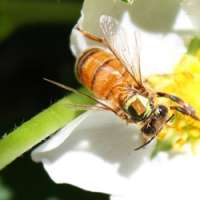Concern over parasites affecting honey bees

Scientists from The University of Western Australia's Centre for Integrative Bee Research (CIBER) tagged 200 honey bee workers to find out how a highly-contagious fungal parasite (Nosema apis) impacts their ability to pollinate crops.
N. apis is a uni-cellular fungus that lives in the gut cells of honey bees and causes dysentery. Especially in combination with other parasites or additional environmental stressors, it is an important contributor to the bee declines observed worldwide.
The CIBER team found that infected worker bees performed more flights, but of shorter duration than uninfected ones. To establish this they fed 100 newly hatched workers with sugar water or sugar water with N. apis spores, and glued tiny 1.5 millimetre computer tags to their backs, tracking the bees' time outside their hive.
UWA Research Associate Dr Ryan Dosselli from CIBER said the research team had expected the parasite to drain energy of worker bees, and knew that flying was an energetically highly demanding task.
"However, it took us by surprise that the fungus would impair the workers' flight duration as early as two days after being infected," he said.
"That a highly contagious parasite is impacting honey bee workers so quickly, is concerning.
"If parasites reduce foraging ranges of honey bee colonies, they ultimately impact the bees' ability to pollinate agricultural crops.
"Bees are important for humans, the environment and agriculture, as they pollinate one sixth of all flowering plants world-wide, and help to produce a third of everything we eat."
Dr Dosselli said it was interesting to see that workers from one colony seemed to cope much better with the parasite than workers of the other two colonies in the experiment. Their flight times were by far the longest, and their immune activity in response to the parasite the strongest of all three colonies investigated.
The researchers are planning to unravel the sophisticated molecular interactions between the parasite N. apis and its host the bee, with the ultimate goal of being able to breed disease tolerant bees.
The research has been published in the online journal Scientific Reports.
More information: Ryan Dosselli et al. Flight behaviour of honey bee (Apis mellifera) workers is altered by initial infections of the fungal parasite Nosema apis, Scientific Reports (2016). DOI: 10.1038/srep36649
Journal information: Scientific Reports
Provided by University of Western Australia



















